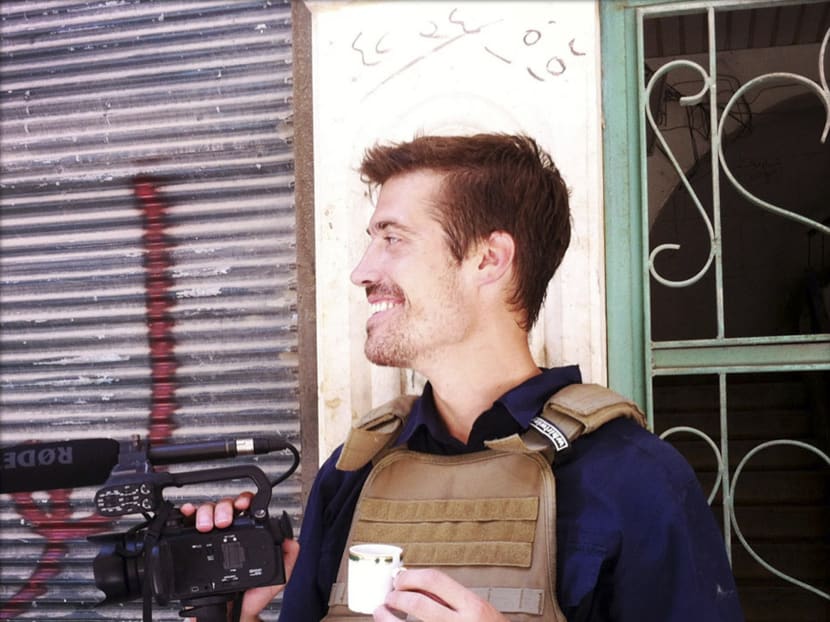Briton suspected of being behind journalist’s beheading
LONDON — The Islamic State jihadist who beheaded American journalist James Foley is believed to be the leader of a group of British militants — dubbed the Beatles — who specialise in hostage-taking in Syria.
LONDON — The Islamic State jihadist who beheaded American journalist James Foley is believed to be the leader of a group of British militants — dubbed the Beatles — who specialise in hostage-taking in Syria.
A former hostage, who was held for a year in the Islamic State stronghold of Raqqa in Syria, told The Guardian newspaper that Mr Foley’s killer was a Briton from London called John. He described John as intelligent, educated and a devout Islamic radical. The British-born militants were referred to as “the Beatles” by fellow jihadists and the hostages because of their nationality, the former captive added.
Mr Foley, 40, was kidnapped in Syria in November 2012 and held in captivity. On Tuesday, the Islamic State released a video showing him kneeling in desert-like terrain beside an armed man dressed in black.
The masked militant, who spoke with a British accent, said the journalist’s death is in retaliation for the United States attacks on the Islamic State in Iraq.
After he spoke, the militant appeared to start cutting at his captive’s neck. Prime Minister David Cameron said it looked “increasingly likely” the killer was British, but that it was “not a time for a knee-jerk reaction”.
The police and security services are attempting to identify Mr Foley’s killer by examining the video and focusing on his distinctive voice, clothes and the fact that he is left-handed.
More than 500 Britons, as well as scores of foreigners from Europe, Australia and South-east Asia, are known to have travelled to Syria and Iraq to take part in the fighting since Syria’s civil war began three years ago.
British security agencies will use their database of names of British people known to have made the journey as its starting point for comparisons with Mr Foley’s killer.
At least 19 Britons, including one suicide bomber, are known to have died in the fighting.
Mr Shiraz Maher of the International Centre for the Study of Radicalisation at King’s College, London, said British extremists fighting across Iraq and Syria have become more brazen and arrogant in recent months.
Some have boasted on Twitter and Facebook about their involvement.
Analysts note that the beheading of Mr Foley at the hands of a British jihadist also suggests militants from the UK are no longer merely foot soldiers within the Islamic State, but have worked their way up to senior positions within the organisation.
Another Briton, Mr Waheed Majeed, carried out a suicide bombing in Syria earlier this year.
The Guardian report added that John had acted as a negotiator in talks earlier this year between the militants and Turkey over the fate of 11 hostages, who were eventually handed to Turkish officials after ransom demands were met.
Dr James Alvarez, a British-American hostage negotiator, said the Islamic State would have deliberately chosen a Briton to carry out the murder to cause maximum shock and outrage in the West.
He said: “Over the past six months, the group’s leaders have been busily perfecting their own brand of murderous and macabre public relations campaigning. It serves their purpose to have people hate them. And there is nothing that will put more hatred into people’s hearts than watching a British person doing something as horrifying as that.”
The horrific beheading of Mr Foley has sparked worldwide outrage.
Indonesian President Susilo Bambang Yudhoyono yesterday called the action of Islamic State militants “embarrassing” to the religion and urged Islamic leaders to unite in tackling extremism.
“It is shocking. It is becoming out of control,” he said in an interview with The Australian. “This is a new wake-up call to international leaders all over the world, including Islamic leaders,” he said. Dozens of Indonesians have travelled to Syria and Iraq to fight.
The Malaysian police also said this week that 19 suspected Malaysian militants arrested from April to June had planned to travel to Syria to learn from the Islamic State, with the aim of setting up of an Islamic Caliphate in the region comprising Malaysia, Indonesia, Thailand, the Philippines and Singapore.
Yesterday, Mr Ayob Khan Mydin, deputy chief of the Malaysian police counterterrorism division, told Reuters that the militants had bought aluminium powder, which is often used as an ingredient in bombs, ahead of a proposed attack on a Carlsberg brewery near the capital Kuala Lumpur.
The plan, which the official said was at the “discussion” stage, would be the first time South-east Asian militants, inspired by the rise of the Islamic State, have sought to launch a major attack at home, adding to officials’ fears of a domestic “blowback” from the Islamic State’s expansion in Syria and Iraq. AGENCIES







